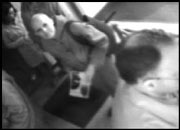The three staffers directly responsible for making this year’s Bookfest the best in recent memory lost their jobs last week. The last day of work for Era Schrepfer, Nicole Turgeon, and Stacie Cone—the entire full-time staff—will be this Friday, five days before Christmas. Their year-round duties included fund-raising, planning for the fall event, and managing an army of volunteers.
In an e-mail sent out to friends on Thursday, Turgeon wrote: “Thank you so much for all of the support and encouragement you have given me during my time at Northwest Bookfest. Unfortunately, it looks like that time has come to an end. As a cost-saving measure, the board of directors has decided to lay off the staff and assume responsibility for basic Bookfest operations.”
The announcement happened to go out the same day as the holiday party for Seattle Arts & Lectures, where an atmosphere of gloom prevailed. Bookfest board members and supporters of the board’s decision mingled uncomfortably with Bookfest volunteers and friends of the now out- of-work staff. (It’s a small town.) “It doesn’t make any fucking sense,” said one Bookfest volunteer. “I just don’t see how it’s going to work. I don’t see how you can put on a festival without a staff. You can’t put on Bookfest as a hobby, or as an aside. It’s too big a thing.”
“There’s really no good way for us to explain how much work it is,” Turgeon said last week, expressing concern over whether the volunteer board could pull it off. Board member Kim Ricketts, who says the layoffs were unavoidable, admitted, “I don’t know the first thing about Porta Potties. I don’t want to know. I don’t even go in one, let alone know how to rent one.”
Moreover, it’s unclear whether switching to a volunteer model is going to solve the organization’s cash problems. “There are not a lot of funders willing to fund an organization that doesn’t have a professional staff,” said Matthew Brogan, executive director of Seattle Arts & Lectures, which is run by a staff of five full-time employees, three part-time employees, and some volunteers. Early this week, Ricketts said the board plans to meet with key volunteers to “see what role they can play,” and she conceded that the board is probably “going to need to hire some production staff,” but that the positions won’t be year-round. And it’s unclear where the money to pay them will come from.
While firing the current staff, who received no severance, helps to solve the immediate deficit problem, it doesn’t solve Bookfest’s bigger issue of cash flow. The organization, as it is currently structured, raises all its money in the spring, spends it all in the fall, and racks up debt through the winter.
“I do think there were other options that could have been explored, and I think it’s sad that it’s gotten to this point,” said Brogan about the layoffs. Among other possibilities, festival attendees could be charged admission, or the size of the event could be scaled back. Or Bookfest could merge its operations with another organization that has facilities and staff in place, such as the library, a bookstore, Richard Hugo House, or SAL. (Brogan says he offered to discuss this possibility with the Bookfest board in the past, but they declined.)
“I would worry a great deal about whether there is going to be a festival next year,” Brogan added.







